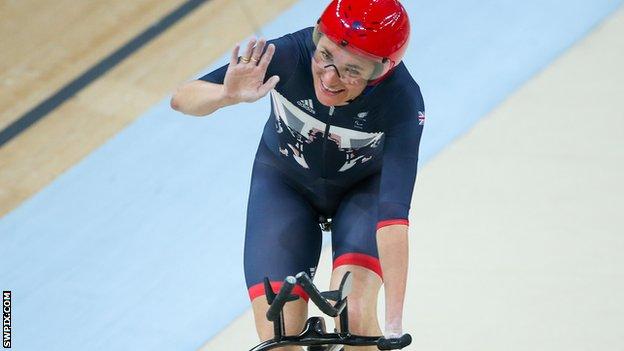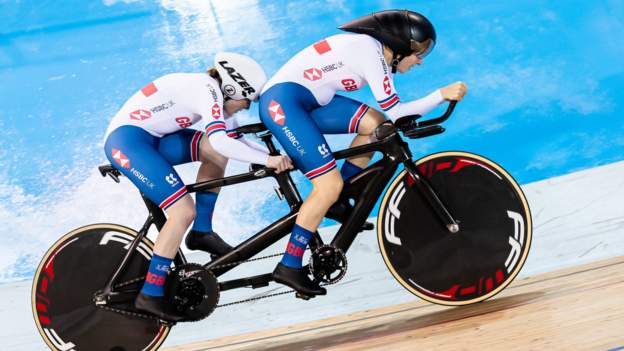
| Venue: Tokyo, Japan Dates: 24 August-5 September Time in Tokyo: BST +8 |
| Coverage: Follow on Radio 5 Live and on the BBC Sport website |
Key information
Dates: 25-28 August (track), 31 August-3 September (road)
Venue: Izu Velodrome/Fuji International Speedway
Gold medals on offer: 51
How does it work?
Para-cycling at the Paralympics includes both track and road cycling.
Track cyclists ride either tandem bicycles or bicycles, while road cyclists compete on handcycles, tricycles, tandem bicycles or bicycles.
The sport includes individuals with cerebral palsy, amputations, other physical impairments and visual impairments.
C1-C5 is for athletes with cerebral palsy, amputees and others who can ride a bicycle while B is for visually impaired cyclists who are classified together and compete on tandem bicycles with a sighted pilot at the front of the bike.
They have events on the track and on the road.
H1-H5 (handcycle) is for riders with impairments affecting either both legs or a combination of the upper and lower limbs (amputees, paraplegics and tetraplegics). H1-4 all compete in a lying position whereas H5 compete in a kneeling position.
T1-T2 (tricycle) is for athletes with cerebral palsy, neurological conditions or other athletes who are unable to ride a bicycle. They compete on the road only.
Some cycling events will be factored, meaning that cyclists from different classes compete against each other and the results take into account the severity of the impairments of each competitor.
As a result, some riders within an event will have their times ‘factored’ while other riders will not. The gold medal goes to the athlete with the fastest time after all the required times have been factored.
The track races at the Paralympics go from the 500m time trial for women up to the 4km pursuits for male C4, C5 and B riders. The pursuits for women and for C1, C2 and C3 male riders are 3km.
Who are the British medal hopes?
Sarah Storey is already Britain’s most successful female athlete with 14 Paralympic golds and can overtake swimmer Mike Kenny’s all-time record of 16. Jody Cundy and tandem pairs Steve Bate and Adam Duggleby and Lora Fachie and Corrine Hall are among those who will be defending their titles from Rio. Dual-sport stars Kadeena Cox and George Peasgood will be hoping to impress in one of the two sports they will compete in in Tokyo.
Who are the other challengers?
While GB will be hoping to match their Rio achievements, where they were the leading nation, there is plenty of competition. China and Australia are among their main rivals in the track races while the USA has made plenty of improvements. On the road, you can expect Italy, the Netherlands and Germany to be strong.
Did you know?
Britain’s Jaco van Gass was serving with the Parachute Regiment in Afghanistan in 2009 when he was hit by a rocket-propelled grenade. He lost his left arm at the elbow as well as suffering a collapsed lung, shrapnel wounds, punctured internal organs, a broken tibia and a fractured knee, requiring 11 operations and intense rehabilitation. Inspired by the 2012 Games, he embarked on new challenges including a trek to the North Pole, running multiple marathons and climbing mountains and is now a three-time world champion and will be making his Paralympic debut.
ParalympicsGB Rio 2016 medals
21 (12 gold, three silver, six bronze).
